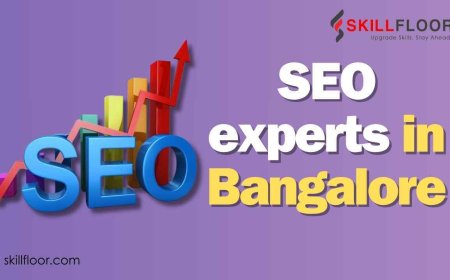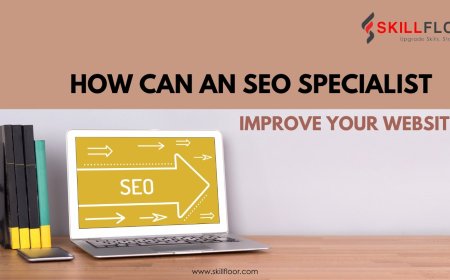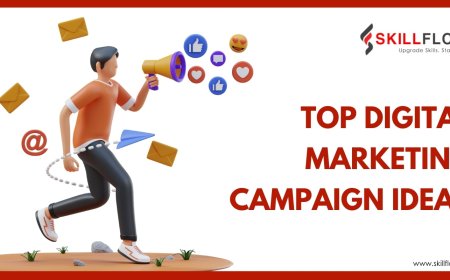Exploring the Spectrum: Different Types of Digital Marketing
Delve into the diverse world of digital marketing. Discover various types and strategies for effective online promotion. Stay ahead with this comprehensive guide.

In today's fast-paced digital landscape, businesses must navigate a diverse range of marketing strategies to stay relevant and competitive. Digital marketing, a dynamic field, offers a plethora of tactics to connect with audiences. Let's delve into some of the most effective types of digital marketing strategies.
Search Engine Optimization (SEO)
Search Engine Optimization (SEO) is the cornerstone of digital marketing. It's a set of practices aimed at improving a website's visibility in search engine results pages (SERPs). The primary objective of SEO is to enhance organic (non-paid) traffic to a website by optimizing various elements such as on-page content, meta tags, website structure, and backlinks. SEO involves keyword research to identify the terms and phrases potential visitors use when searching for relevant content or products. By strategically incorporating these keywords and continually refining the website, businesses can climb the search rankings, increasing their chances of attracting quality traffic and potential customers. SEO is an ongoing process that requires regular monitoring and adaptation to stay competitive in the online landscape.
Content Marketing:
Content is king, and content marketing revolves around creating and distributing valuable, relevant content to attract and engage a clearly defined target audience. Blogs, infographics, videos, and eBooks are just a few mediums used in this strategy.
-
Content marketing is a strategic approach to creating and distributing valuable, relevant, and consistent content.
-
It aims to attract, engage, and retain a target audience by providing them with useful information.
-
Types of content include blog posts, articles, videos, infographics, eBooks, podcasts, and more.
-
Content marketing builds trust and authority, positioning businesses as industry experts.
-
It's a long-term strategy that focuses on building relationships and brand loyalty.
-
Successful content marketing requires understanding the target audience and tailoring content to their needs.
-
It plays a vital role in SEO by improving search engine rankings through quality, optimized content.
-
Content marketing can be used at various stages of the buyer's journey, from awareness to conversion.
-
Measuring success involves tracking metrics like website traffic, engagement, leads generated, and conversions.
-
Content marketing fosters brand awareness, customer retention, and lead generation when executed effectively.
Social Media Marketing:
Leveraging social platforms like Facebook, Twitter, Instagram, and LinkedIn, businesses engage with their audience, promote products/services, and build brand awareness. It’s a powerful tool to create a sense of community around your brand.
-
Social Media Marketing (SMM) uses social platforms like Facebook, Twitter, Instagram, and LinkedIn for promotional purposes.
-
It's a powerful tool to engage with a target audience and build brand awareness.
-
SMM involves creating and sharing content (text, images, videos) to attract and retain followers.
-
Paid advertising options are available on most social platforms to boost visibility.
-
Social media analytics help measure performance and refine strategies.
-
It's essential to tailor content to each platform and audience.
-
SMM fosters community and customer interaction, strengthening brand loyalty.
-
Influencer partnerships can amplify reach and credibility.
-
Trends and algorithms on social media platforms continually evolve, requiring adaptability.
-
Effective SMM involves setting clear goals and KPIs to track success.
Email Marketing:
Email marketing is a powerful digital marketing strategy that involves sending targeted emails to a list of subscribers or potential customers. It serves as a direct and personalized communication channel, allowing businesses to share updates, promotions, content, and product information with their audience. Email marketing can nurture leads, drive conversions, and build lasting relationships with customers. It relies on creating engaging and valuable content, segmenting email lists, and analyzing metrics to refine campaigns for optimal results. When executed effectively, email marketing can be a cost-effective and highly efficient way to engage with your audience and achieve your marketing goals.
Pay-Per-Click Advertising (PPC):
Pay-Per-Click Advertising (PPC) is a digital marketing strategy where advertisers pay a fee each time their ad is clicked. It's a highly targeted and measurable approach commonly used on search engines like Google and social media platforms. Advertisers bid on specific keywords or demographics to have their ads displayed to a relevant audience. PPC campaigns provide instant visibility, making it an effective tool for driving website traffic, generating leads, and increasing sales. Advertisers have control over budget and can track performance in real-time, allowing for continuous optimization to maximize return on investment (ROI).
Affiliate Marketing:
Affiliate marketing is a performance-based digital marketing strategy where businesses partner with affiliates, often individuals or other companies, to promote their products or services. Affiliates earn a commission for every sale, click, or action generated through their marketing efforts. This arrangement benefits both parties: businesses can expand their reach and boost sales without upfront costs, while affiliates monetize their online presence by promoting relevant products or services. Affiliate marketing leverages the power of collaboration, driving mutually beneficial outcomes in the digital marketplace.
Influencer Marketing:
Influencer marketing is a powerful digital marketing strategy that revolves around collaborating with influential individuals or celebrities in various niches to promote products, services, or brands. These influencers have a dedicated and engaged following on social media platforms, blogs, or other digital channels. By leveraging their authenticity and credibility, brands can tap into the influencers' established audiences, effectively reaching and resonating with potential customers. Influencer marketing campaigns often include sponsored content, product reviews, endorsements, or collaborations, and they can be a highly effective way to create brand awareness, generate leads, and drive conversions in the digital landscape.
Video Marketing:
Video content is highly engaging and has become a dominant force in digital marketing. It harnesses the power of visual storytelling to engage, inform, and entertain audiences. Platforms like YouTube, TikTok, and Instagram Reels provide fertile ground for brands to showcase their products, share tutorials, and connect with their target demographic. Video content is highly shareable, making it an effective tool for virality and brand exposure. Whether it's product demonstrations, customer testimonials, or behind-the-scenes glimpses, video marketing offers versatility and authenticity that can forge a deeper connection with your audience in an increasingly visual world.
Mobile Marketing:
Mobile marketing is a dynamic strategy that capitalizes on the ubiquity of mobile devices. It encompasses a range of techniques, from SMS campaigns and mobile apps to location-based services and responsive website design. With the majority of internet users accessing content via smartphones and tablets, optimizing for mobile is crucial. This approach allows businesses to engage users in a more personalized, immediate manner, enhancing user experience and driving conversions. By leveraging the power of mobile, marketers can tap into a vast and highly engaged audience, making mobile marketing an indispensable tool in the digital landscape.
Chatbot Marketing:
Chatbot marketing is a dynamic digital strategy that harnesses the power of artificial intelligence (AI) to engage and interact with customers in real-time. Chatbots are computer programs designed to simulate human conversation, providing instant responses and assistance to users. This approach enables businesses to offer personalized customer support, answer inquiries, and guide visitors through their sales funnel 24/7. Chatbots can be integrated into websites, messaging apps, and social media platforms, making them a versatile tool for reaching and nurturing leads. With the ability to gather valuable data and insights, chatbot marketing is a valuable addition to any modern marketing arsenal, enhancing customer experiences and streamlining communication.
In the dynamic realm of digital marketing, businesses have an array of strategies at their disposal. By understanding the nuances and benefits of each type, marketers can create a comprehensive, multi-channel approach that resonates with their target audience. Remember, a well-crafted digital marketing strategy is not about using every tool available, but rather about selecting the right mix for your unique business goals and audience preferences. Stay agile, adapt to trends, and watch your digital presence thrive.





























































